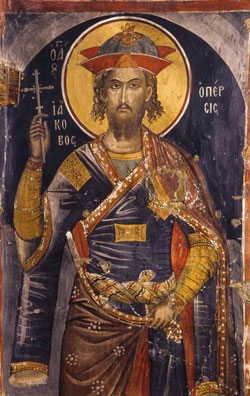
Feastday: November 27
James was a favorite of King Yezdigerd I of Persia and a Christian. He abandoned his religion when Yesdigerd launched a persecution of the Christians. When the king died, James repented of his apostasy and declared himself to be a Christian to the new king, Bahram. When James refused to apostasize, he was executed by having his body cut apart piece by piece, beginning with his fingers (hence his surname Intercisus - cut to pieces), and then beheaded. His feast day is November 27.
| This article may require cleanup to meet Wikipedia's quality standards. The specific problem is: Wording is loose and unclear, not up to encyclopedic standards (October 2018) |
 The martydom of James, from the Menologion of Basil II.
The martydom of James, from the Menologion of Basil II.
Saint James Intercisus, also known as Saint James the Mutilated (died 421) was a Syriac Christian saint born in Beth Huzaye (Syriac: ܒܝܬ ܗܘܙܝܐ) in Persia. His epithet, Intercisus, is derived from the Latin word for "cut into pieces," which refers to the manner of his martyrdom: he was slowly cut into twenty-eight pieces. His death started the Roman-Sassanid War (421-422).
His feast day is November 27.
Life
Tradition states that he was a military officer and courtier to Yazdegerd I who had apostatized after this ruler began to persecute Christians. Under the influence of his Christian family, however, he expressed his faith to Yazdegerd's successor, Bahram V, leading to his execution.
Death
He was killed in Beth Lapat (Gundishapur). The ruins of this city are near Dezful, Iran.
At his execution, he survived the loss of limbs until he was beheaded. His followers requested his body parts as relics, but this request was denied, so they stole the body parts, which were somehow sent to the Portuguese cathedral of Braga and put into a sarcophagus in the Relics Chapel.
Legend
James' story is recounted in The Golden Legend.
According to Katherine Rabenstein, he may be a composite character of James of Beit (who, having renounced Christianity under Yazdegerd, was shamed by his parents and changed his mind, becoming a martyr under the persecution of Bahram); Mar Peros (similarly shamed by his parents and martyred in 448); and James of Karka (a 20-year-old notary to Bahram, tortured alongside many others after casually remarking that he’d rather be cut into pieces than renounce God).
Churches and monasteries
The Church of St. James Intercisus in the Armenian Quarter of Jerusalem was dedicated to him.
The Monastery of St. Jacob Persian in Sireți, Strășeni Moldova, the Monastery of St. Jacob Persian in Deddeh, Lebanon and the monastery of St James the Mutilated in Qara, Syria are all dedicated to him.
A piece of bone from the finger of St. James the Mutilated (Yacob Mapasco) is placed in a golden casket, which is kept in the "kurishupally" [a small chapel dedicated to Yacob Mapasco Sahada by Malankara Metropolitan Mar Dionysious V and Saint Geevargese Mar Gregorios, (Parumala Thirumeni)] in the premises of St Peter's & St Paul's Jacobite Syrian orthodox Church at Pengamuck, in Kerala, India.
This relic is brought to Pengamuck by Pulikkottil Joseph Mar Dionysious II (as he has his roots in Pengamuck), after it was gifted to him at his consecration as Metropolitan Mar Dionysious V of Malankara (Kerala) at Mardin by Patriarch Ignatius Yakoob II.





